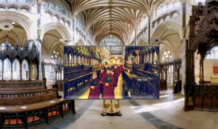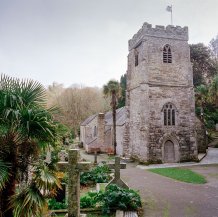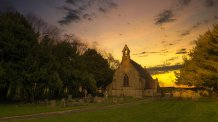News Stories 2021
News from around the University that may be of interest to friends of the University Chapels.

Wells Cathedral, located in Somerset, is often described as the ‘most poetic’ of the English Cathedrals and was the first to be built in the Gothic style.
The University of Exeter has embarked on a new partnership with Wells Cathedral to uncover more about the stunning building known as the ‘most poetic’ of England’s Cathedrals.
Both organisations will cooperate on research, including using digital technology in conservation, analysis and interpretation of the Cathedral’s manuscripts, early printed books, archives and holdings.
Their existing working relationship has been formalised with a Memorandum of Understanding that will see the University and Cathedral forge a closer partnership through projects that are mutually beneficial to the University, Cathedral and heritage and education sectors.
As well as research there will also be opportunities for student work placements and volunteering.
Wells Cathedral, located in Somerset, is often described as the ‘most poetic’ of the English Cathedrals and was the first to be built in the Gothic style.
Its iconic West Front with 300 medieval carvings and the 14th-century scissor arches are among the highlights of its architecture.
Wells Cathedral is also home to a thriving spiritual, musical and historical community stretching back nearly 850 years.
The Cathedral has an international reputation for the quality of its music department and is the recipient of several tourism awards – recently achieving a Silver Eco Church Award.
Professor Neil Gow, Deputy Vice Chancellor Research and Impact at the University of Exeter, said: “It is great to see that Wells Cathedral is embarking on a major project to open its ancient buildings more fully to the public and to enhance the visitor experience for diverse audiences.
“With the University of Exeter’s long-standing expertise in history and our recent ground-breaking development of digital applications for the cultural heritage sector, this promises to be a very productive and exciting partnership.”
The Very Reverend Dr John Davies, from Wells Cathedral said: “I am delighted that Wells Cathedral and The University of Exeter have formalised a working partnership through this Memorandum of Understanding.
“This is a wonderful opportunity to share knowledge and experience whilst creating opportunities for the respective communities we serve to grow. We hope that this partnership will provide great benefit for the South West.”
To find out more about Wells Cathedral, see: https://www.wellscathedral.org.uk and for heritage news at the University of Exeter, see: https://www.exeter.ac.uk/heritage/.
Date: 9 September 2021

The EU-funded VISTA AR project is using new technologies to help Exeter Cathedral 'retell its story to the next generation'
Virtual reality devices at heritage sites in France and the UK have been adapted so tourists can ‘visit’ an attraction in lockdown – and in the case of Exeter Cathedral even listen to the choir sing.
The VISTA AR project, led by the University of Exeter Business School and part of the EU’s Interreg France (Channel) England programme, has worked closely with Exeter Cathedral, Château de Fougères in Brittany and others to develop digital devices that create new kinds of visitor experiences using augmented and virtual reality.
These include tablet-based audio-visual tours, VR headsets allowing visitors to meet characters from the past, and an augmented reality app that can be pointed at an artefact or landscape to reveal what it looked like hundreds of years ago.
Now, as the global pandemic has forced heritage sites to shut their doors or rethink how they operate, the VISTA team has launched new online teaser versions of their AR and VR devices to allow people to enjoy them from home.
VISTA has joined forces with Exeter Cathedral to provide a 360 degree video of a choir recital that will be launched this Friday, in a taster of a new project where Cathedral visitors get to experience an immersive choral performance via VR headset.
It follows the launch of another collaboration with the Cathedral in which visitors have the opportunity to explore online the ancient books and manuscripts within the Cathedral’s collection.
The digitised texts include the Exon Domesday, the only surviving regional draft of William the Conqueror’s great Domesday Book of 1086, and The Exeter Book of Anglo-Saxon Poetry, the oldest book of English poetry in the world.
This online experience has been launched ahead of a project to develop and install digital touchscreens in the Cathedral that will give visitors access to books, artefacts and other historical treasures.
Professor Andi Smart, the VISTA AR Project Lead and Professor of Operations and Process Management at the University of Exeter Business School, said: “These experiences were produced to give potential visitors a glimpse of the experiences that will be deployed on site over the summer.
Many sites have been promoting online content throughout the pandemic and it is true that for some visitors, an element of ‘online fatigue’ is creeping in. But we hope that these experiences will help to encourage people to try out the onsite experience for real.”
For The Very Revd Jonathan Greener, the Dean of Exeter, the new experiences represent a new chapter in Exeter Cathedral’s story:
“It’s been nearly a thousand years since the foundation of Exeter Cathedral, so we love to tell visitors about our history. But this is very much a living and evolving Cathedral, so we’re equally enthusiastic about our present and future. That’s why we're excited to be part of the VISTA AR project.
“It’s about applying new technologies to retell our story to the next generation – whether they’re visiting here in the building or discovering us online. And because some of these experiences are now online, we get to share something of the wonder of Exeter Cathedral and its treasures with a much wider audience.”
VISTA is also set to unveil online ‘teasers’ of its other projects with heritage sites across the UK and France.
An AR app for the Botallack tin mine in Cornwall that allows visitors to view the mines through history will be previewed through an interactive Google street view of the reconstructed mining landscape.
And ahead of launching an AR app for the South West Coast Path, the longest waymarked long-distance footpath in England, VISTA will launch another 360° Google street view of the birdscape with information about six bird species.
In France, VISTA has also been working with the Château de Fougères in Brittany to develop AR and VR devices that give visitors an experience of castle life back in medieval times, and will be releasing a promotional video showing the devices in action.
And potential visitors to the Musée sous-marin (Lorient Submarine Museum) in Brittany will soon have the chance to go into the heart of the ocean with the submariners of last century with a 360° YouTube immersive teaser video produced by VISTA.

Date: 25 May 2021

St-Just's Church, St. Just-in-Roseland. Credit: Emily Thornhill
A new documentary series shows the mystery, beauty and history of Cornwall’s stunning maritime churches.
The films show how the religious buildings played a central role in the county’s seafaring past. Historians and students at the University of Exeter have spent the past three years researching how the churches show stories of smuggling, piracy and wrecking, and how religion and the sea have played a key role in Cornwall’s culture, identity and language.
The documentary series, Exploring Cornwall’s Maritime Churches Project, is free for all to watch on YouTube.
The first episode shows how Cornwall is renowned for its folklore and features some of the county’s most magical places – including St Nectan’s Glen, Tintagel, Padstow’s Doom Bar and Zennor. It shows how the sea and the church are at the heart of famous myths and legends, and why mermaids, giants and chivalric knights have emerged from certain places.
Early folk tales travelled via early Celtic traders and pilgrims and were retold by Cornish storytellers, otherwise known as droll tellers. The film includes modern Cornish folksingers Harry Glasson, the all-female acapella group ‘Figurehead’ and two Penzance-born sisters, Martha and Rosa Woods.
The first episode also shows how many folk tales travelled the Atlantic through Cornwall’s participation in the slave trade, and how evidence such as graves and ecclesiastical records can reveal much about the African diaspora in Cornwall, from as early as the Tudor period. Undergraduate students such as Yaz Fosu and Natalie Wragg discuss why it is imperative to not rose-tint these particular narratives of Cornwall’s past.
The second episode shows how fishing, trade and ship building contributed to Cornwall’s distinctiveness and its sense of place – as well as legal and illegal smuggling activities. It shows how the sea has inspired the writing of authors including William Sydney Graham and Daphne Du Maurier. Former fisherman Robert Williams discusses traditional fishing practices, and historian Dr Helen Doe discusses shipbuilding at Polruan’s Lanteglos church. The film shows people’s personal connections to their local maritime churches, and how in turn, these churches reflect their stories through their architecture or decoration.
The third episode shows the history of shipwrecks in Cornwall and how churches have both saved lives and facilitated smuggling. It shows locations including the Lizard Peninsula. As part of the project 15-year-old Lucy Whatley wrote a tribute to shipwrecks and this is read by actor Issy Inchbald and brought to life with powerful music composed by Nerys Grivolas. The documentary shows different ways of exploring shipwrecks, including freediving and scuba diving. It also shows how parts of broken up ships are preserved in maritime churches, and explores why people collect pieces from wrecks – whether this is commemorative or barbaric.
Footage for the documentary was captured by local filmmaker, Kyle Richardson. The films were written, produced and presented by Victoria Jenner.
The film series was produced on behalf of the University of Exeter’s Institute of Cornish Studies.
The research work was conducted by staff at the University of Exeter’s Institute of Cornish Studies and the Falmouth and Exeter Students' History Society. The project was funded by the National Heritage Lottery. It was led by Dr Garry Tregidga, Director of the Institute of Cornish Studies, with Victoria Jenner acting as Project Manager, Rebecca Orchard as the coordinator for the volunteer researchers and Dr Jo Esra advising on research skills and maritime history.
Date: 13 May 2021
News Stories 2020

The new training will support clergy’s physical and mental health and help them to understand their current feelings as well as reflect on the issues they currently face.
Ministers struggling with trauma caused by coronavirus will get special training to help them cope with the challenges of the pandemic.
The new training, held online for small groups from next month, will support clergy’s physical and mental health and help them to understand their current feelings as well as reflect on the issues they currently face.
The training, developed as part of a University of Exeter research project examining trauma in church congregations, is informed by lessons learned in the aftermath of the Grenfell disaster, the terrorist bomb in Manchester, and terrorist attacks in London. This has shown the importance of self-care for ministers looking after communities who have experienced trauma.
The one-off sessions will help people understand the physical effects of trauma on the body’s nervous system. The project has shown that having background knowledge of how trauma works helps ministers to shepherd their energies and resources and to respond with compassion. The training will help people understand any physical issues they are experiencing may be a normal reaction to anxiety and trauma rather than any sign of weakness or inadequacy.
Professor Christopher Southgate, who is leading the project, said: “Ministers have had to cope with conducting funerals in unusual and difficult circumstances and help communities through periods of loss, illness and financial issues during the crisis. They also face other challenges such as using technology to stream services and reopening churches.
“Ministers are experiencing profound challenges having to cope with their own, and other people’s anxiety and distress. Their understanding of God and the world may also be challenged. This has been a period of huge loss, of life, health and opportunities. The training helps people to understand everyone is coping with this in different ways. Helping clergy come to terms with their own challenges will help them attend to, and recognise, the same issues in their congregations.
“A lot has been asked of ministers during this time and many haven’t had much respite so we think it is essential for them to have support like this. We’ll adapt the training to their individual needs. At the end clergy will be better able to understand their own reactions and those of others. Having a trauma-informed ministry will enable them to work creatively with challenges they are now facing.”
Hilary Dawson, Archdeacon of Gloucester, said the work of the Tragedy and Congregations project has been a “life-line” in recent weeks. She said: “The blogs, meditations and reflections have been invaluable as I have sought to live well and exercise ministry with care in this time of pandemic. They have also informed the way I have tried to support those for whom I have care and responsibility. We have posted updates on the Diocesan website and colleagues have found these a great help and encouragement. As we move one step at a time through this difficult time the wisdom of the project team has been hugely beneficial: noticing what is happening around us, recognising the early activity and busyness, supporting one another in tiredness and even disillusionment, and drawing on our reserves of prayer and faith to be creative as we serve others. I am confident that these resources will continue to help us to be gentle with ourselves and others as we move with hope into an unknown future.”
The project’s website tragedyandcongregations.org.uk has further advice for clergy and other ministers. Training materials produced as part of the project has been sent to parishes around the country and taken up by many Anglican dioceses.
The work is funded by the Grant Templeton World Challenges Foundation and the Garfield Western Foundation (in association with Sarum College).
Date: 17 June 2020
